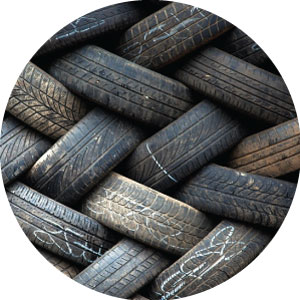No Sweat: Keep Your Equipment Cool This Summer
Summer is officially here once again. It’s not just people that start to drag when temperatures soar, your construction equipment, and vehicles can suffer, too. And when they do, job site productivity and bottom line profitability decline, while the risk of downtime and accidents increases. That’s not cool!
Here are some reminders about ways you can protect your machines and your people from overheating this summer.
 Be prepared: tire pressure
Be prepared: tire pressure
Tire pressure rises one pound per square inch for every 10-degree increase in the ambient temperature. Unrelieved direct sun exposure can exacerbate that. If tires are over-inflated, machines lose traction, the tread wears faster, and a tire could even blow, causing damage and injuries. For obvious reasons, blowouts happen more often in hot summer weather.
Check tire inflation regularly – for every tire because they can differ depending on worksite conditions. Make sure pressure is within OEM specs but is far enough below the recommended threshold to leave room for inevitable increases as machines work in the sun.
Be prepared: cooling systems
Cooling system problems are one of the most common causes of equipment downtime in the summer. If you haven’t already performed annual flushing and replacement of coolant, don’t wait any longer. Check the drained coolant for signs of degradation or impurities, because those could indicate a larger problem in the offing. Inspect the radiator and cap as well.
This is a good time to do a pressure test, too and inspect hoses, the water pump, and other system components for signs of wear or leakage. Some experts recommend replacing the thermostat every other year, as a preventive measure, so you can be confident it is working properly.
Be prepared: batteries
We often think of battery problems as a winter problem, and it can be when they don’t have the juice to get machines started. But here’s the thing. The electrolytes in lead-acid batteries can actually evaporate when the weather is hot, leaving the battery weakened and more likely to fail if you keep running the machine. AGM (absorbed glass mat) batteries found in some newer equipment models are less touchy about the heat.
Be prepared: driver/operator cooling
Modern construction equipment cabs have air conditioning, but when was the last time you fully checked out those systems to make sure they are functioning optimally? An over-heated vehicle driver or equipment operator is much more likely to be distracted and/or fatigued, the perfect recipe for accidents. Along with inspecting the AC, make sure sun visors, fans, or other in-cab coolers are all present and working properly.
 Throw some shade
Throw some shade
We all know that relentless sunshine takes a toll on humans, but it’s easy to forget that over-exposure to direct sunlight can damage heavy equipment, especially hydraulics. It’s great if you can park machines under a shelter of some kind overnight, but that’s not always possible. Any shady spot will do, for workday idle periods as well as overnight and weekends. If need be, a tarp can provide temporary shade and also help protect machines from dust that typically accompanies summer weather.
And, back to those humans, be sure your crew members are taking plenty of rest breaks in the shade and drinking plenty of water. Dehydration is dangerous, and it can sneak up on you. Promote the use of sunscreen, too, because no one wants skin cancer and those who work outdoors are at greatest risk.
If the weather is going to be particularly hot, try to schedule work so that the worst sunlight hours – typically between 10 am and 2 pm — are downtime. That way, people and machines can stay out of the sun when it is most dangerous.
Let technology help you monitor machinery
By using data regularly collected by telematics, especially in real time, you can closely monitor the status of each piece of equipment. This is valuable all the time, but especially when hot weather can accelerate impending problems. Some new equipment comes with “condition monitoring” technology designed just for this purpose.
The better prepared your construction equipment is for summer working conditions, the lower the chances you will have preventable problems. And if you take steps to keep machines and people as cool onsite, you can look forward to a productive summer.

